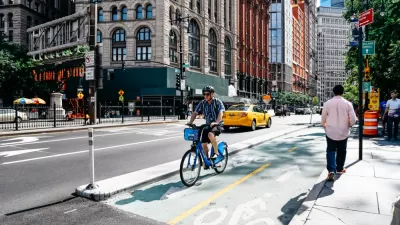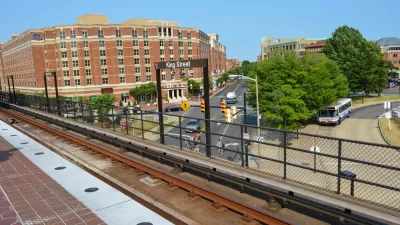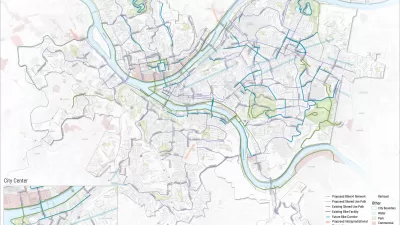As a result of the dominant development patterns and transportation practices of the 20th century, churches have receded in their role as an anchors for neighborhoods and broader communities.
Chuck Marohn starts a recent post on Strong Towns with a pointed appeal for the role of religious institutions in encouraging less auto-centric lifestyles: “Church leaders around the country should be doing everything they can to reconnect the social bonds of our communities. We reconnect the social bonds most easily and effectively when we reconnect the physical bonds. We should be obsessed with getting people out of their cars and back into each other’s lives.”
By reconnecting social bonds, Marohn means encouraging multi-modal transportation options: “It is more than a little ironic that I’ve had more conversations with our next door neighbors of the past sixteen years in the brief moments walking in and out of church than I’ve ever had on our street or, perhaps more amazingly, in each other’s homes. When either of us travel to church, we back out of our garages, hit the automatic garage door opener to close it, drive to church, park in one of the convenient parking lots, attend church and then do the trip home in reverse. Essentially, we’re Churching Alone,” writes Marohn, with the final words a reference to Robert Putnam’s Bowling Alone.
Marohn’s post was inspired by a specific controversy in his hometown of Barinerd, Minnesota (but church parking has been controversial elsewhere, as well), where the priest asked parishioners to attend council meanings in opposition to a plan that would a bicycle lane and remove street parking on a street adjacent to the church.
FULL STORY: Living in communion

Alabama: Trump Terminates Settlements for Black Communities Harmed By Raw Sewage
Trump deemed the landmark civil rights agreement “illegal DEI and environmental justice policy.”

Study: Maui’s Plan to Convert Vacation Rentals to Long-Term Housing Could Cause Nearly $1 Billion Economic Loss
The plan would reduce visitor accommodation by 25% resulting in 1,900 jobs lost.

Planetizen Federal Action Tracker
A weekly monitor of how Trump’s orders and actions are impacting planners and planning in America.

Wind Energy on the Rise Despite Federal Policy Reversal
The Trump administration is revoking federal support for renewable energy, but demand for new projects continues unabated.

Passengers Flock to Caltrain After Electrification
The new electric trains are running faster and more reliably, leading to strong ridership growth on the Bay Area rail system.

Texas Churches Rally Behind ‘Yes in God’s Back Yard’ Legislation
Religious leaders want the state to reduce zoning regulations to streamline leasing church-owned land to housing developers.
Urban Design for Planners 1: Software Tools
This six-course series explores essential urban design concepts using open source software and equips planners with the tools they need to participate fully in the urban design process.
Planning for Universal Design
Learn the tools for implementing Universal Design in planning regulations.
Caltrans
Smith Gee Studio
Institute for Housing and Urban Development Studies (IHS)
City of Grandview
Harvard GSD Executive Education
Toledo-Lucas County Plan Commissions
Salt Lake City
NYU Wagner Graduate School of Public Service





























